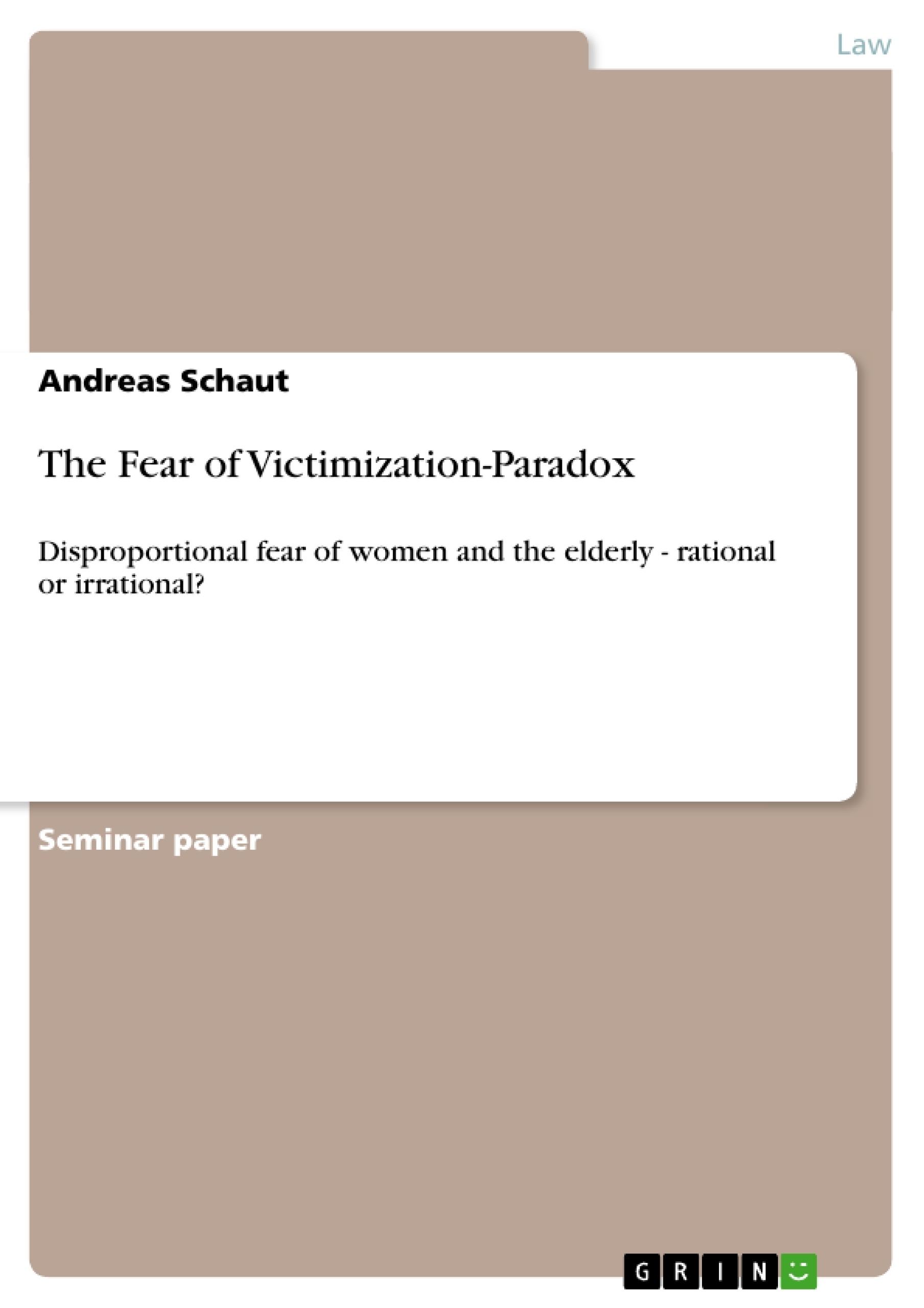I. Introduction
Regarding the fear of victimization, researchers soon found a disproportional high fear among women and elderly people. In this paper I do not only want to describe the different attempts of explanations dealing with these findings. I also want to test if and to what extend the single explanations fit to the fear of victimization among young German law students...
II. Description of the Paradox
First of all, the Fear of Victimization - Paradox is in the literature more commonly known as the Fear of Crime - Paradox. But this is inexact: Speaking about the fear of crime, you have to distinguish between a person’s perception of his own chances of victimization and the individual estimation of the seriousness of criminal activity in society. In this context the fear of crime is viewed just as fear of victimization. This is the cognitive dimension of fear of crime, the perception that one is vulnerable and exposed to victimization, and that victimization has serious consequences for oneself. That’s why I prefer the term “Fear of Victimization – Paradox”.
Such fear is usually measured by the so called standard term. That is – with some formulation variants: “How safe do you feel when you walk alone in your community at night?” This question asks if the person is personally fearful of crime, and less if he or she is concerned about rising crime as a social issue. But the validity of this standard term is not undisputed: One the one hand, it does not contain the victimization as reference point of fear at all , on the other hand it is not able to cover public crime inside buildings. Nevertheless it certainly contains aspects of fear of victimization and it enables former investigations to remain comparable to recent ones...
Inhaltsverzeichnis (Table of Contents)
- Introduction.
- Description of the Paradox.
- Women
- The elderly.....
- Conclusion..\li>
- Theoretical Explanations.......
- Generalized Fear Hypothesis
- Explaining the fear of women
- Generalized fear of sexual molestation and hidden violence.....
- Altruistic fear
- Explaining the fear of the elderly.
- The role of the media
- Indirect victimization
- Explaining the fear of women
- Vulnerability Hypothesis..
- Physical vulnerability.
- Social vulnerability.
- Differential Exposure Hypothesis.....
- Generalized Fear Hypothesis
- Valuation and personal suggestions.
Zielsetzung und Themenschwerpunkte (Objectives and Key Themes)
This paper aims to describe the disproportional fear of victimization amongst women and the elderly, exploring various explanations for this phenomenon. The author seeks to test the applicability of these explanations within a specific group – young German law students. Through a questionnaire, the paper aims to compare the levels of fear of victimization between young men and women.
- The Fear of Victimization Paradox
- Explanations for the Fear of Victimization Paradox, including the Generalized Fear Hypothesis, the Vulnerability Hypothesis, and the Differential Exposure Hypothesis.
- Empirical Research on the Fear of Victimization among young German Law Students
- Gender Differences in Fear of Victimization
- Limitations of the Study and its Applicability
Zusammenfassung der Kapitel (Chapter Summaries)
- Introduction: This chapter introduces the topic of the Fear of Victimization Paradox, highlighting the disproportionately higher fear of victimization among women and elderly people. The paper outlines its goal to analyze and test the applicability of different explanatory theories by studying young German law students.
- Description of the Paradox: This chapter defines the Fear of Victimization Paradox and differentiates it from the Fear of Crime Paradox. It provides a detailed explanation of the paradox and discusses the standard term used to measure fear of victimization, along with its limitations. This chapter also presents a table illustrating the higher fear of victimization among women compared to men across different age groups.
- Women: This chapter focuses on the fear of victimization among women. It reveals the significantly higher fear of victimization experienced by women compared to men, as indicated by the results of the author’s questionnaire. The chapter further explores the relationship between the fear of victimization and actual victimization among women, questioning the assumption that higher fear correlates with higher risk. It also touches upon the relationship between victimization experiences and fear of victimization.
Schlüsselwörter (Keywords)
This paper focuses on the Fear of Victimization Paradox, exploring various explanations for the disproportionate fear of victimization among women and the elderly. Key themes include the Generalized Fear Hypothesis, the Vulnerability Hypothesis, the Differential Exposure Hypothesis, empirical research on the fear of victimization among young German law students, gender differences in fear of victimization, and the relationship between fear and actual victimization experiences. The paper utilizes a questionnaire to gather data from young German law students, analyzing their responses to gain insights into the applicability of the various theoretical explanations. The study explores limitations of the data and its generalizability, ultimately contributing to a deeper understanding of the Fear of Victimization Paradox and its complexities.
- Quote paper
- Andreas Schaut (Author), 2006, The Fear of Victimization-Paradox, Munich, GRIN Verlag, https://www.grin.com/document/87827




